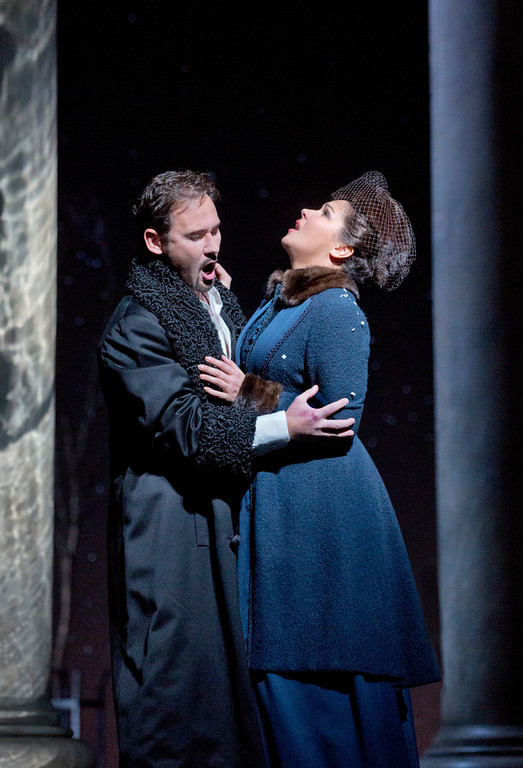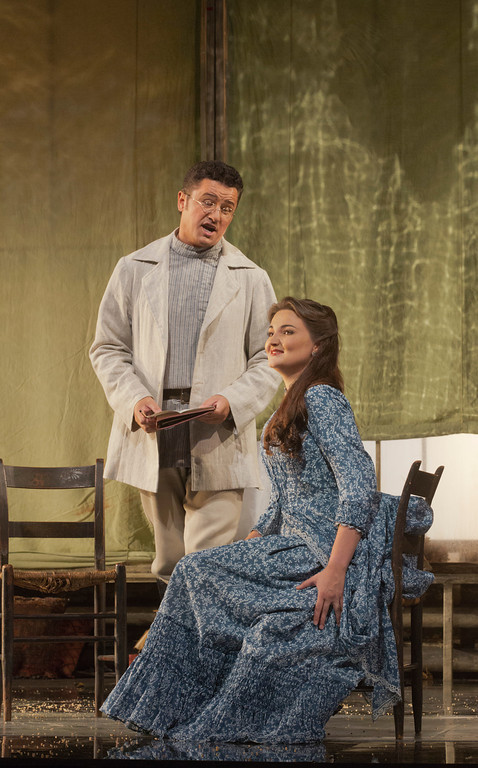Uneven dramatics apart, the Met opens season with a handsome new “Onegin”

Mariusz Kwiecien as the title character and Anna Netrebko as Tatiana in Tchaikovsky’s “Eugene Onegin,” which opened the Metropolitan Opera season Monday night.
Photo: Ken Howard/Metropolitan Opera
[Editor Note: All New York reviews are now posted first on New York Classical Review.]
The Metropolitan Opera opened its season Monday night with a new production of Tchaikovsky’s Eugene Onegin that clearly displayed what the company can do so well and where it can fail.
The Met means star power, in the audience and on the stage. The Lincoln Center plaza was packed for the simulcast, and there was a small and vocal demonstration against Vladimir Putin and Russia’s recently passed anti-homosexuality laws. In the house, two men shouted anti-Putin slogans before the performance began.
Opening night at the Met is clearly a big deal, as the stellar cast and production team made manifest Monday night. Anna Netrebko and Mariusz Kwiecien portrayed Tatiana and Onegin, Valery Gergiev was in the pit, and the production, shared with the English National Opera, came from Deborah Warner and was directed by Fiona Shaw, both making their Met debuts. The Met can draw this kind of star power, and afford it, and for the most part it all paid off handsomely.
Most of the cast excels, especially Oksana Volkova as Tatiana’s sister Olga and Piotr Beczala as her fiancé, and Onegin’s friend and later enemy, Lenski. Both sang vibrantly and effortlessly and they were completely in character, with no sense that they were self-conscious about performing.
Beczala was especially impressive, charming when expressing his love and moving and sympathetic when Lenski feels betrayed by Onegin. The second leads were natural, confident and always interesting; even when they simply standing or sitting, they riveted the eyes’ attention.
Such wasn’t always the case with the stars, however, and this is the drawback of a company that promotes its productions as star vehicles.
Kwiecien was mixed in his role debut as Ongein. The Polish baritone is a capable but slightly anodyne singer. His intonation and phrasing are excellent, his sound and articulation always clear and he hits all the emotional high points you expect but nothing more. Kwiecien’s acting was stronger on posturing rather than emotional depth, seemingly trying to convey an arrogance that instead came off as self-consciousness. When he wasn’t singing, he disappeared.
The same, surprisingly, was true with Netrebko, a real star of the operatic stage. Her singing Monday night was frequently exceptional. She has trouble focusing her lower register, but her sound is beautiful and her phrasing is simple and always musical. When she sings pianissimo, it is intensely expressive.
Her acting does not always match her singing, however, and, like Kwiecien, when she’s not singing, her Tatiana has less stage presence. Tatiana is supposed to be introverted, but Netrebko, when silent, was recessive. Some of her blocking goes against the norm that Shaw establishes, with gestures like an overdone swoon at the end of her beautifully sung Letter aria that looked jarringly diva-ish in the context of this production. It plays to what is the expected spectacle of opera, but goes against the staging’s naturalism.
Neither she nor Kwiecien are completely convincing in their vocal characterizations and the acting wasn’t always strong enough to make up the difference. While this production’s Olga and Lenski are completely believable, Tatiana and Onegin just assert what they are experiencing. Without this single flaw, the Met’s Onegin would be an unforgettable production.
But the performance, otherwise, was excellent. The production is simple and quite beautiful for being so understated. The period sets by Tom Pye are relatively free of clutter. Shaw fills them with people and human activity, and the naturalism of her directing grounds the production in familiarity, making the opera’s outsize and—to contemporary sensibilities— outlandish emotions understandable. Her crowd scenes are impressively organized, packed with detail but never fussy, and the principal action is always to the fore.
The dancing in these scenes, by choreographer Kim Brandstrup, is excellent, and the superb lighting is the essential detail of the production. Jean Kalman’s design bathes the opening scene in a marvelous golden glow of the morning sun, and sets time, place and mood with warmth and sharpness.
Gergiev led a gorgeous, flowing performance. He seems to channel the spirit of Tchaikovsky directly from the afterworld, the lyrical phrases rolling out of his hands with ideal pace. The Met Orchestra had a thinner sound under him than usual, but the textures were clear and added intimacy to the singing. Gergiev’s inclination to emphasize pulse was the ideal way to side-step the composer’s weakness in rhythmic structure, although this meant there were passages when the orchestra and singers fell a bit out of sync. Those moments are minor and easily forgettable when the overall musical experience was so lovely and satisfying.
Eugene Onegin runs through December 12. Beginning November 23, the principals change to Marina Poplavskaya as Tatiana, Elena Maximova as Olga, Rolando Villazón as Lenski and Peter Mattei as Onegin, with Alexander Vedemikov conducting.
Eugene Onegin will be shown in theaters worldwide as part of The Met Live in HD series October 5 at 12:55 PM EST. metoperafamily.org

Piotr Beczala as Lenski and Oksana Volkova as Olga in Tchaikovsky’s “Eugene Onegin.”
Photo: Ken Howard/Metropolitan Opera